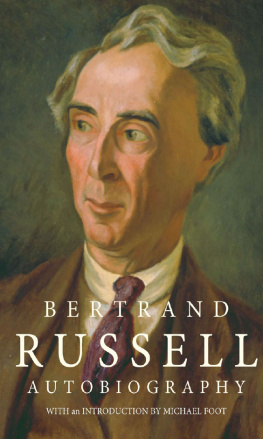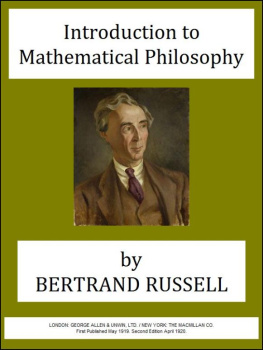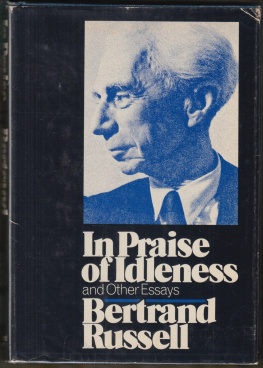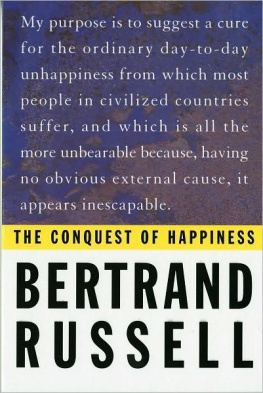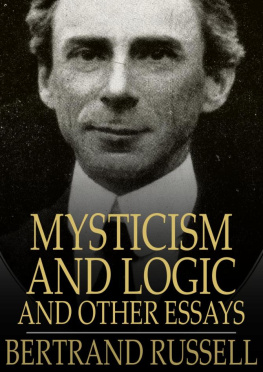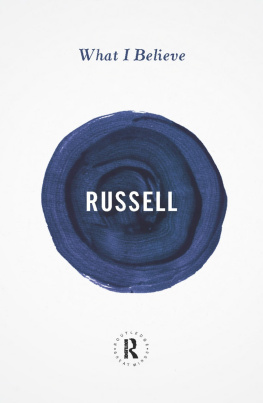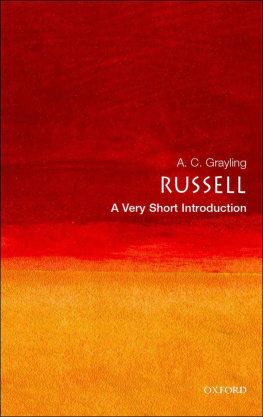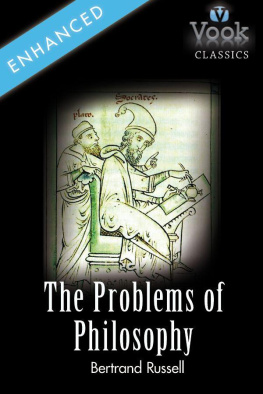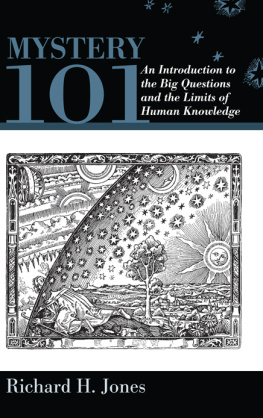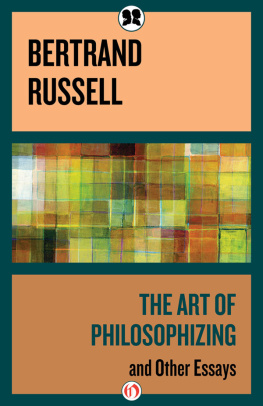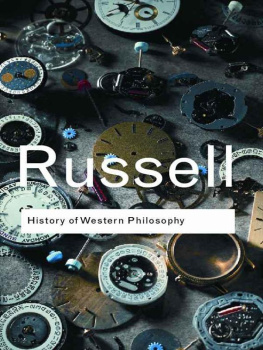The Problems of Philosophy
Bertrand Russell was one of the most important philosophers of the twentieth century. His primary interest was in the foundations of mathematics, and his three-volume Principia Mathematica (written with Alfred North Whitehead) is the classic attempt to carry out the programme of deriving the whole of mathematics from a set of simple, self-evident truths. He also wrote widely on other areas of philosophy, and published a large number of writings on social and moral issues.
John Skorupski is Professor of Moral Philosophy at the University of St Andrews, and author of English-Language Philosophy 17501945 (1993) and John Stuart Mill (1989).
BERTRAND RUSSELL
The Problems of Philosophy


Great Clarendon Street, Oxford OX2 6DP
Oxford University Press is a department of the University of Oxford.
It furthers the Universitys objective of excellence in research, scholarship,
and education by publishing worldwide in Oxford New York
Athens Auckland Bangkok Bogot Buenos Aires Calcutta
Cape Town Chennai Dar es Salaam Delhi Florence Hong Kong Istanbul
Karachi Kuala Lumpur Madrid Melbourne Mexico City Mumbai
Nairobi Paris So Paulo Shanghai Singapore Taipei Tokyo Toronto Warsaw with associated companies in Berlin Ibadan Oxford is a registered trade mark of Oxford University Press
in the UK and in certain other countries Introduction John Skorupski 1998
First published 1912
First published as an Oxford University Press paperback 1967
Ninth impression, with appendix, 1980
Second edition 1998
Reissued 2001
All rights reserved. No part of this publication may be reproduced,
stored in a retrieval system, or transmitted, in any form or by any means,
without the prior permission in writing of Oxford University Press,
or as expressly permitted by law, or under terms agreed with the appropriate
reprographics rights organization. Enquiries concerning reproduction
outside the scope of the above should be sent to the Rights Department,
Oxford University Press, at the address above You must not circulate this book in any other binding or cover
and you must impose this same condition on any acquirer British Library Cataloguing in Publication Data Data available
ISBN-13: 978-0-19-285423-0
16
Printed in Great Britain by
Clays Ltd, St Ives plc
Contents
Introduction
BERTRAND RUSSELL (18721970) wrote this celebrated introduction to philosophy in 1911 and published it in January 1912. It has been read by generations of students of philosophyin and out of universitiesever since. The book belongs to one of Russells most fertile philosophical periods. In 1910 he had completed the long and wearying technical work required for Principia Mathematica, his great collaborative work with A. N. Whitehead and one of the cornerstones of modern mathematical logic. He said that his intellect never quite recovered from the strain; yet on questions of general philosophy he evidently experienced a new release of freshness and vigour. Though the book is written as a popular introductionRussell called it his shilling shockerit advances definite views and introduces thoroughly new ideas, for example on truth. It does so crisply, undogmatically, unobtrusively, with luminous clarity. It certainly deserves its continued popularity.
Russell does not deal with all the problems of philosophy. As he explains in the preface, he confines himself to those about which he thinks he can be positive and constructive. The upshot, given his interests at the time, is that the book is mainly concerned with epistemologythe branch of philosophy which investigates what we can be said to know or reasonably believe. Russell also comes to some striking conclusions, on the basis of this investigation, about the ultimate kinds of things there are. He does not deal with ethics or with a range of classical questions concerning mind and action, such as the nature of the self or the question of free will. But something of his ethical outlook is conveyed in what he has to say about the character and value of philosophya topic which recurs throughout the book and gets a final chapter to itself.
Sense-data, physics, and instinctive belief
Russell begins with an analysis of perception. Appearances are relative: a table looks different from different angles and in different lights. But we do not think the table itself changes. So Russell postulates what he calls sense-data. They are things that are immediately known in sensation, of which we are immediately aware (p. 4); they change, though the table doesnt. In introducing them, Russell also distinguishes between an act or state of awareness and its object. A state of awareness is mental, its object may or not be mental. This leads to a first important turning point. For with this distinction to hand (and it will be important throughout the book), Russell might have concluded that when you perceive the same table from different angles or in different lights, the object of your awareness is the same though the experiences you have, which constitute your awareness of it, differ. He could have held that the object of your awareness is the table, not the way it looks. He does not take this view; he makes the way it looks to you the object of your awareness, and he takes this object, the sense-datum, to be mental in the sense that it is private to your mind and would not exist if you did not.
What then is the relation between sense-data and physical objects? Physical objects cause sense-data; it is the aim of physics to tell us whatever we can know about them. What we can know about them and the physical space and time they occupy, Russell eventually concludes in , is only their relational structure, not their intrinsic nature. But first he raises a more basic questionif the reality is not what appears, have we any means of knowing whether there is any reality at all? And if so, have we any means of finding out what it is like? (p. 6). It is logically possible, he thinks, that I and my experiences and thoughts are all that exists. But the commonsense belief in matter is instinctive and leads to the simplest systematic view, so we may accept it, even though we recognize the logical possibility that it is false (pp. 1011).
Russell proceeds to draw a moral:
All knowledge, we find, must be built up upon our instinctive beliefs, and if these are rejected, nothing is left. But among our instinctive beliefs some are much stronger than others, while many have, by habit and association, become entangled with other beliefs, not really instinctive, but falsely supposed to be part of what is believed instinctively.
Philosophy should show us the hierarchy of our instinctive beliefs, beginning with those we hold most strongly, and presenting each as much isolated and as free from irrelevant additions as possible. There can never be any reason for rejecting one instinctive belief except that it clashes with others; thus, if they are found to harmonize, the whole system becomes worthy of acceptance.
It is of course possible that all or any set of our beliefs may be mistaken, and therefore all ought to be held with at least some slight element of doubt. But we cannot have reason to reject a belief except on the ground of some other belief. (pp. 1112)
Two points stand out about Russells method, as exemplified here.
1. It makes essential appeal to the rational authority of instinctive belief. Russell is not simply inferring to the simplest hypothesis, instinctive or otherwise. In , where he discusses induction, he does not mention inference to the simplest hypothesis (or best explanation) as a method of inference at all. The inductive principle which he there states on p. 37 could not allow us to infer from sense-data to physical objects; it could only allow us to infer to correlations among sense-data.
Next page

